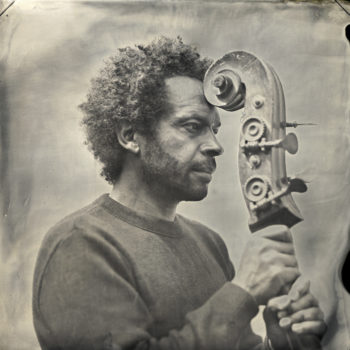
Bassist of the band Lo’Jo until 2016, Kham Meslien has performed on all continents, from the big stages of the world’s cities to the Australian and American deserts. He also plays in the trio Sweet Back and has collaborated, on stage or in the studio, with many international musicians: Robert Plant, Archie Shepp, Robert Wyatt and Justin Adams. With this solo double bass project, Kham Meslien embarks on a new adventure, introspective and shared.
******************
Bassiste du groupe Lo’Jo jusqu’en 2016, Kham Meslien s’est produit sur l’ensemble des continents, des grandes scènes des mégalopoles aux déserts australiens et américains. Il joue également dans le trio Sweet Back et a collaboré, sur scène ou en studio, avec de nombreux musiciens internationaux : Robert Plant, Archie Shepp, Robert Wyatt ou encore Justin Adams. Avec ce projet à la contrebasse solo, Kham Meslien se lance dans une nouvelle aventure, introspective et partagée.
Listen / Download / Order LP & CD
A festival organizer asked for a solo, and for Kham Meslien it was as much a revelation as an opportunity.
Twenty years of loyal service in a band, and Kham left the artistic direction of his career to the strings of his double bass. From now on, his career should take the less coded route of music where freedom reigns. That of jazz and its improvisations dictated of purely instrumental compositions.
Written and practiced on stage, Kham’s compositions have taken advantage of an imposed quarantine to perfect and immortalize his songs on the album Fantômes…Futurs, his first solo album.
Double bass player turned leader, Kham sat his double bass, a mixture of power and gravity, at the heart of a virtual band for which he occupies all the positions. Percussions hit on the wood of his imposing instrument, discreet sweepers or rhythmic double bass handed over their spells to the printed circuits of a looper.
Looped and cadenced, each one was then played back on itself, for several bars. The time for Kham to install the deep tonality and warmth of the strings that resonate on the wood to become storytellers. From a music with images where the vibrations blacken the first lines, impulse melodies and themes, then leave the solos free to speak and to write the rest.
An intense, instinctive, emotional speech. Crossing a melancholic storm before finding the immensity of a plain over which to float. To follow the novel of an Andean charango playing oriental melodies, blurring both places and distances, mixing cultures to become one. Hanging on to the suspense of the notes that are being played, following the sinuous paths that lead to darkness as well as to light. Or to go the opposite way. To settle down next to Anthony Joseph to listen to a poem, the only vocal track on the album.
On the voluminous body of an instrument balanced on its the climates follow one another, the lively and swift fingers fade into the background to the benefit of the bow, which will search the strings for in the strings and buried feelings. “Ta Confiance”, “The Alarm” or “Le Saule Pleureur”, each track tells the story of Kham as much as it gives an indication of the path to follow. It’s up to each of us to go where we want to go where he wishes, the paths being different as the listening different paths as you listen and, above all, as the moment passes.
***********************************************************************************************************************
Un organisateur de festival en demande de solo, et c’est pour Kham Meslien le déclic autant que la révélation. Vingt ans de loyaux services dans un groupe, et Kham laissait aux cordes de sa contrebasse la direction artistique de sa carrière. Désormais, celle-ci devrait emprunter la route moins codifiée des musiques où la liberté règne. Celle du jazz et de ses improvisations dictées par l’instant, celle des compositions purement instrumentales. Écrites et rodées sur les scènes, celles de Kham ont profité d’un confinement imposé pour s’affiner et s’immortaliser dans Fantômes…Futurs, son premier album solo.
Contrebassiste devenu leader, Kham a assis sa contrebasse, fin mélange de puissance et de gravité, au centre d’un groupe virtuel dont il occupe tous les postes. Percussions frappées sur le bois de son imposant instrument, balais discrets ou contrebasse rythmique ont remis leurs sorts aux circuits imprimés d’un looper. Mis en boucle, cadencés, chacun s’est alors rejoué sur lui-même, le temps de plusieurs mesures. Le temps pour Kham d’y installer la tonalité profonde et la chaleur de cordes qui résonnent sur le bois pour se faire narratrices de récits. D’une musique à images où les vibrations noircissent les premières lignes, impulsent mélodies et thèmes, puis laissent aux soli la liberté de prendre la parole pour écrire la suite.
Une parole intense, instinctive, émotionnelle.
Traverser un orage mélancolique avant de retrouver l’immensité d’une plaine au-dessus de laquelle planer. Suivre le roman d’un charango andin jouant des mélodies d’Orient, brouillant à la fois lieux et distances, mélangeant les cultures pour n’en faire plus qu’une. Accroché au suspens des notes qui s’égrènent, suivre les sinuosités qui mènent à l’obscurité comme à la lumière. Ou faire le chemin inverse. Se poser près d’Anthony Joseph pour l’écoute attentive d’une poésie, seul titre vocal de l’album.
Sur le corps volumineux d’un l’instrument en équilibre sur son pied, les climats se succèdent, les doigts vifs et véloces s’effacent au profit de l’archet qui ira chercher dans les cordes dramaturgie et sentiments enfouis. « Ta Confiance », « The Alarm » ou « Le Saule Pleureur », chaque titre raconte Kham autant qu’il donne l’indication de la piste à suivre. Libre à chacun ensuite d’aller là où il le souhaite, les chemins se faisant différents à mesure des écoutes et surtout du moment.